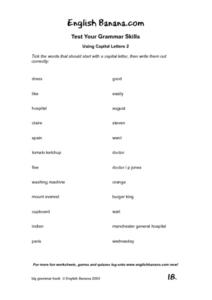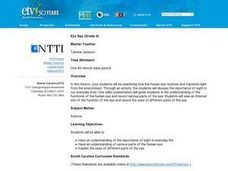Curated OER
Question Forms Using Verb "to do" as an Auxiliary Verb (Present Simple Tense) 3
In this language arts worksheet, students analyze 10 sentences which have the words in scrambled order. Students rearrange the words to make a question using the verb "to do." Example: you do OK feel (Do you feel OK?)
Curated OER
Question Forms Using Verb "to do" as an Auxiliary Verb (Present Simple Tense) 1
In this language arts worksheet, students examine 10 sentences which are scrambled. Students rearrange the words to make each question correct, using the verb form of "to do." Example: do you how do (How do you do?)
Curated OER
Question Forms Using Verb "to have" as an Auxiliary Verb (Present Perfect Tense) 2
For this language arts worksheet, students examine 10 scrambled sentences. Students rearrange the words to make a questions using verb "to have" as an auxiliary verb in the present perfect tense. Example: you her have before been (Have...
Curated OER
Question Forms Using Verb "to have" as an Auxiliary Verb (Present Perfect Tense) 3
In this language arts learning exercise, students examine 10 sentences which are scrambled. Students rearrange the words in each sentence to make a question using verb "to have" as an auxiliary verb in the present perfect tense. Example:...
Curated OER
Using Capital Letters 2
In this language arts worksheet, students examine a list of 30 mixed common and proper nouns. Students indicate which words should be capitalized and write them out correctly.
Curated OER
Using Capital Letters 1
In this language arts learning exercise, students analyze a list of 30 mixed common and proper nouns. Students mark which words should start with a capital letter and write them out correctly.
Curated OER
Cyber Currency, Currently
Young scholars explore the value of currency and how to save and earn interest. In a key lesson, kids even get to purchase items in their classroom's general store. It's a fun way to learn the importance of being financially literate!
Curated OER
Because of Winn-Dixie
Students complete a variety of activities related to the book "Because of Winn-Dixie" by Kate DiCamillo. They create a scrapbook of the characters in the book, play a reading comprehension maze game, and participate in an online...
Curated OER
Eye Spy!
Students explore using descriptive words by playing a What Do You See? game, describing items in a Mystery Bag, and using Eye-Spy binoculars on an on-campus field trip. They read the book, I Went Walking, and write descriptions of a...
Curated OER
Vocabulary Toss
Students play a vocabulary game. When they identify the correct work-wall word, they earn a point and a chance to double his or her point by shooting a basket. This game is designed to reinforce vocabulary skills by providing a fun way...
Curated OER
Traditional Remedies
Young scholars discover alternative medicines from around the globe. In this world culture lesson, students read text from Africa, Ireland, Tibet and Tanzania discussing known remedies to diseases. Young scholars discuss with...
Curated OER
Checkmate
Students start identifying the cause and effect relationships in games of Chess. Using the internet, they research the history of the game and how the roles for each of the pieces. They develop a skit based on the roles and...
Curated OER
You're Special
Students utilize a new language to tell someone they care for them. For this complimenting lesson, students practice saying nice things to friends and strangers in their target language. Students react to the lesson afterwards and...
Curated OER
Participating in a Class Birthday Party
Students celebrate a fellow peer in class by having a party for him or her. In this foreign language lesson plan, students celebrate a classmate's birth using their target language to host a party. Students create a bulletin...
Curated OER
Synonym Trees
Fifth graders create synonym trees by writing their main word on the tree trunk and gluing synonym words to represent the leaves. In this synonyms lesson plan, 5th graders play a class game where they must find a partner who has a...
Curated OER
Fun With -ing Verbs 3- Test Your Vocabulary Skills
In this -ing ending vocabulary skills page, students underline the most appropriate -ing ending word to complete 15 sentences. They choose between two word that end in -ing and make the most sense in the sentence.
Curated OER
Fun With Irregular Verbs
In this irregular verbs activity, students choose which of the three verbs in parenthesis is the best form of the verb to make each grammatically correct. Students choose the correct verb in fifteen sentences.
Curated OER
Fun with -ing Verbs
In this -ing verbs grammar worksheet, students choose which appropriate word out of two to use to complete each of the fifteen sentences in this worksheet correctly. Students work on fine tuning their skills at using verbs correctly.
Curated OER
Problems and Giving Advice
Students explore decision making by seeking out advice. In this life problem solving lesson, students discuss problems they encounter in daily life and listen to their classmates discussions of all the available options. Students...
Curated OER
Who Said Math Can't Be Fun?
With these innovative ideas, demonstrate to your class that math doesn't always have to be hard work.
Curated OER
Do the Hokey Pokey in Many Languages
Students replace the body part words in the tune The Hokey Pokey with the same body part words in other languages. They learn the vocabulary more readily because of the connection to music.
Curated OER
Vocabulary Zoo Game
Students participate in an activity which is focused on new vocabulary words and their definitions. They study vocabulary that will be used in an upcoming read aloud. They make an animal sound each time one of the vocabulary words is read.
Curated OER
Mad Libs Worksheet - Make Me A Video Game!
In this parts of speech review worksheet, students fill in 21 blanks with the part of speech listed in order to create a Mad Libs-style story.
Curated OER
Common Idioms 1
In this language arts worksheet, pupils learn that idioms are spoken or written sentences where the meaning is not obvious. Students match the 10 idioms to their meanings.























